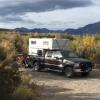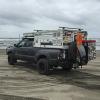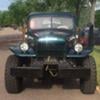My question is:
- Aren't you worried about insurance in case of an accident (being overloaded)?
- Overloaded pickups tend to break (frame) - Is that a problem you are aware of? If so, how do you handle it?
- what is your approach to that obvious problem?
My 2¢:
Any engineer worth his pay builds in a safety factor into all his designs. So if your truck has a GVWR of 6000 lbs it is not going to break at 6001 lbs. The safety factor is company specific and they usually don't want to tell you what it is for obvious reasons.
Any system (mechanical especially) will wear more the closer to maximum loading you get.
Having been in meetings with marketing and accounting where blood flowed ankle deep at the suggestion of adding 1/2¢ to the cost of the product, I would doubt that simply changing one component would significantly increase the GVWR of a truck. One, components are usually well matched with load bearing capacity with the others because of cost and weight concerns. Two, I cannot imagine any marketing department not wanting to put E rated tires on a truck, calling it a 'camper special' and charging more for it.
The only two components I am concerned about with overloading are brakes and tires, since they can affect others. Tires should never, ever, ever be overloaded; bad things happen! Insufficient brakes can be somewhat accommodated by modifying your driving. Worn tires and bad brakes are a deadly combination.
I don't get my undies in a wad about someone I pass being a few hundred pounds over max, i worry about the behemoths with 3 feet of overhang and two slide outs wallowing down the road on a 3/4 or 1T truck pulling a huge boat.
As to insurance: I don't know. But in our litigious society it wouldn't surprise me if someone gets sued for being over GVWR as reason for causing the accident and the courts are pretty much a crapshoot.
As to frame breaking: I havn't seen it and I have seen some repeatedly overloaded trucks.
I have run three Dodge trucks to close to 300,000 miles with little problem. I would have no problem taking them into the boonies. Got rid of them because of body rust and small stuff starting to break.
I agree with PackRat: determine your needs and usage and then go get the truck/camper that will meet your requirements. I have a Grandby on a Ram 2500: ~ 800 lbs under GVWR wet. I like a little margin in my life.
jim



















